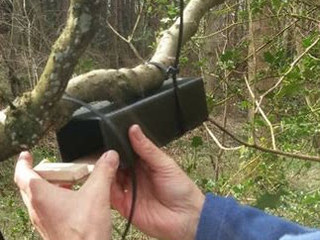NEW PROGRAMME ANNOUNCEMENT Hazel Dormouse Surveying Workshop
- Jun 4, 2019
- 4 min read
Updated: Jun 19, 2019

This is a unique opportunity for people with learning difficulties to take part in environmental field studies . Our spaces are unfortunately limited, please apply now to avoid disappointment.
We are now taking applications for our new workshop
_________________________________________________________
ABOUT THE WORKSHOP
Rambling Salamander have been advocating for involvement of people with learning difficulties into environmental field studies and conservation since 2017 and kept researching various suitable, local projects that can be put into practise. We came across this fantastic, long-term, National Dormouse Monitoring Programme (NDMP) run by People's Trust of Endangered Species (PTES)
The NDMP monitors dormouse population trend across Great Britain and part of this project also covers our local woodland. Equipped with a knowledge and start-up guidance from the North Buckingham Dormouse Group, Rambling Salamander participants will be surveying our local dormice !
AIM OF THE WORKSHOP
The aim of this regular, long-term workshop is to help people with learning difficulties to gain confidence and self-reliance skills in real-life settings. A set of skills that can enable people to engage with and actively contribute to their community be it as volunteers , or, as being part of a wide-concept activity such as a national project, it can help with finding employment possibilities.
INTRODUCTION TO HAZEL DORMICE
Once a common sight in Britain, Hazel Dormice are now extinct in many counties, mostly by changes in woodland management, farming practices and loss of hedgerows that have all taken a heavy toll on their living space. But fear not, there are still people who care and work hard to reverse the decline.
Dormice are hanging on mostly in southern parts of England and Wales and also here in Buckinghamshire , where a population of dormice have been reintroduced into Little Linford Wood after their displacement by the Channel Tunnel rail link project in 1998.
FINDING DORMICE USING FOOTPRINT TRACKING TUNNELS
Surveying Hazel Dormice is not an easy task - not only are they small and nocturnal, they spend up to three-quarters of the year in hibernation. Their active hours are mostly spent well out of sight in trees and dense, thick vegetation. Thus, recording their presence is often a case of searching for field signs rather then for the dormice themselves.
In 1998, a population of dormice was introduced into Little Linford Wood where these tiny creatures were given the freedom of the woodland and have thrived here, however for the last four years Little Linford Wood has showed no signs of the dormice.
In this workshop you will be producing much-needed survey work to track the dormice whereabouts by using a new method - footprint-tracking tunnels.
HOW DOES IT WORK ?
Footprint tracking tunnel is a non-invasive tool that is identifying dormice by their footprints. The footprint tunnels are placed along hedgerows, trees or other edge habitats and tied up to the horizontal branches, using reusable cable ties. A strip of a white paper and ink-pads are positioned onto the plywood insert.
The Dormice are very inquisitive creatures, they will walk over ink-pads and leave their footprints on a strip of white card as they investigate the tube. Their footprints are distinctly shaped , dormice have triangular foot pads as shown on the images below.
The ink is harmless to animals and it is made from crushed charcoal and mixed with vegetable oil. This blend is then applied on wide masking tape that serves as the ink-pad, as documented below.
YOU WILL BE HELPING WITH A REGULAR SURVEY
It is a simple, effective and great survey method for finding the presence of dormice, yet very suitable to undertake by people with learning difficulties.
Rambling Salamander participants will be monitoring the tracking tubes, checking and identifying the footprints, taking notes, reporting the findings, cutting out and replacing the white cards, making the ink and re-inked the ink-pads, and deploying new footprints tubes where possible.
WHEN THE WORKSHOP STARTS ?
The surveying has already started and as soon as we have the right number of participants ready to go, we are out on the fields and looking for dormice signs. Please apply today if you feel this is your cup of tea as we have limited availabilities.
HOW OFTEN WILL WE MEET UP ?
We are going to meet once a week to start with. As more footprint tubes can be deployed to track down dormice movements, there will be more time needed spent on surveying, only then will we increase our meet ups.
WHERE WE WILL BE MEETING ?
We will meet at the Rambling Salamander office in Newport Pagnell.
The address is 149, Tickford Street,
See the sketched map for directions if using a bus
COST INVOLVED
The one-day-a-week regular workshop costs £32 per person/per week. Transport from the meeting point to the surveying site and back is included in the cost as well as our public liability insurance.
HOW TO APPLY
This is a regular, long-term workshop, linked to the national monitoring programme and we are looking for people with a committed attitude who don't mind spending time in nature, having curious mind and trying to discover and learn new skills.
Reading and writing skills are desirable but not essential, however being able to follow instructions and to communicate are necessary skills for this workshop.
This workshop is intended for young people and adults from 16+ with learning difficulties, who struggle with a focus, attention, motivation, and are finding it difficult to achieve, to fit in or having a low self-esteem.
If you are seriously thinking about taking part in our workshop, please send us an email and in a few words say who you are and what it is that you like about nature and animals.
You can also send an email on behalf of someone you know who would like to be part of this project if they have writing difficulties.
We will then send you an application form and set up a follow-up meeting together.
Please send us your email at Martina@ramblingsalamander.co.uk























Comments